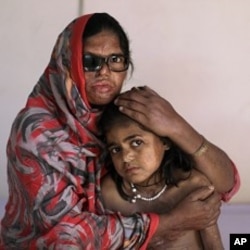In Pakistan, human rights activists are hoping the publicity surrounding the country's first Oscar winning film, a documentary about survivors of acid attacks, will help raise awareness and change the laws to protect victims of a crime that disfigures hundreds of women each year.
Sharmeen Obaid-Chinoy and Daniel Junge’s Oscar triumph for the documentary short film Saving Face has been a cause for celebration in the Pakistani filmmaker’s home country. The film focuses on the work of London-based plastic surgeon Mohammad Jawad, who travels back to his homeland to treat those disfigured by acid attacks, mostly women who were targeted by members of their own family. Oboid-Chinoy is the first Pakistani to win the prestigious award, and she dedicated her Oscar to all the women in Pakistan working for change.
Pakistani human rights activists are happy that Saving Face won the award and hope it will focus world attention on these horrific crimes against women.
Valerie Khan, Chairperson of the Acid Survivors Foundation, who also collaborated on Saving Face, says the Oscar win and the film itself send a message about the empowerment of women.
“It's the women, the Pakistani women, who have won the first Oscar," said Khan. "So it means you also have Pakistani women who are empowered, and again this film is all about hope and and tomorrow, progress. It is not about victims. It is about surviving and turning into agents of change.”
She says there are more than 200 acid burning attacks against women in Pakistan each year. Activists hope the award-winning documentary will help make more people aware of the problem and pressure the government to take stronger measures to protect women. Last year, the country's parliament passed laws that explicitly criminalized acid attacks. But human rights groups want laws that also address rehabilitation and financial assistance for the victims.
Nayyar Shabana Kiyani of the Aurat Foundation, a women's rights organization, say she thinks the film's success will move the issue to the forefront of policy makers' agendas.
“You know, the issue of acid burning cases in Pakistan is quite critical and a number of women are basically being victimized by their spouses sometimes, by their family members, immediate family members, so I think this will bring a very [significant] change in terms of policy and legislation,” said Kiyani.
Kiyani says she is encouraged by the film's international acclaim and its message: that through dedication and commitment, real change can be achieved.






